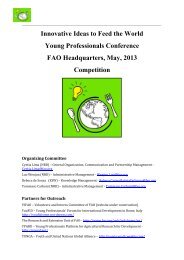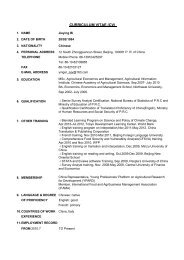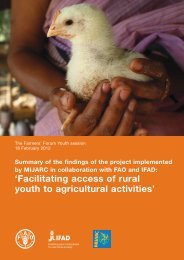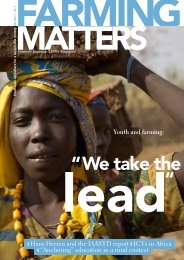UNIVERSITE DE DSCHANG - YPARD
UNIVERSITE DE DSCHANG - YPARD
UNIVERSITE DE DSCHANG - YPARD
You also want an ePaper? Increase the reach of your titles
YUMPU automatically turns print PDFs into web optimized ePapers that Google loves.
Abstract<br />
Reinforcing producer’s capacity (CEF) is a new extension approach initiated in North Cameroon in 1998<br />
through « Pôle Régional de la Recherche Appliquée au Développement des Savanes d’Afrique Centrale<br />
(PRASAC) ». The best results obtained in that part of the country have led the Duras Project to extend<br />
that approach in the Southern part of the country. Tested in Akonolinga in 2006, the purpose of this<br />
approach is to stimulate discussion among farmers and to improve their farm management practices.<br />
After two years of assisting farmers, it seems important to assess what have been achieved for them<br />
and estimate the impact.<br />
Six villages (Mvan, Ndibidjeng, Mingeumeu, Mengos, Ndéllé, and Ondeck) of the Akonolinga subdivision<br />
where CEF was experimented were retained as the sample areas for the study. Seventy two farmers<br />
benefiting from the CEF approach were randomly selected, six animators and the managers of the<br />
“Association pour le Développement des Exploitations Agricoles du Centre (A<strong>DE</strong>AC)” project were<br />
interviewed. Data were collected using a questionnaire addressed to farmers, and interview guide<br />
addressed to animators and the managers of A<strong>DE</strong>AC project. Descriptive statistics (means, percentages<br />
ect...) were used to analyse the data using SPSS software and triangulation method was also used to<br />
analyse the data of interview guides.<br />
The monography of A<strong>DE</strong>AC show that, CEF activities are complementary to the programmes<br />
(agricultural program, capacity building program and micro finance program) of A<strong>DE</strong>AC. Interview with<br />
animators reveal that, animators in the study area are young (37 years old), all hold FSLC and seventy<br />
five percent of them have effectively been trained on one of the modules (crop season prevision plan,<br />
farming system, economic analysis) of CEF.<br />
An analysis of these results showed that, farmers who benefited from the training are average 39 years<br />
old, are educated and they have all applied what they have learned in their farms. A relative change due<br />
to CEF activities was observed in 90 % of the farmers in terms of their farming system practices,<br />
agricultural techniques and economic analysis. In fact they developed mono cropping practices,<br />
determined distance between plants, established their farm budget, better organised their work. Eighty<br />
seven percent of them often discuss about the CEF approach with non members when they are drinking<br />
in “club de vin fort” or at home during a visit to a neighbour or a family member. The farmers declared<br />
that, they know at least one non member who has improved on his farming practices after discussion<br />
(adoption of mono cropping, respect of distance between plants, plan their crop season). Those non<br />
members brought these changes because they wanted to either satisfy their curiosity (61 %) or because<br />
they have witnessed the changes in the farming practices of the members (39 %).<br />
CEF in Akonolinga appears as a developmental approach adapted to the farmers’ situation but which is<br />
not yet well appropriated by the actors’ concerned (managers of A<strong>DE</strong>AC, animators and farmers). As in<br />
other areas where CEF were experimented, appropriation of this new approach need a lot of time<br />
(relative time) for mutual learning between animators and farmers. Results also showed that, the level of<br />
education of animators is insufficient. At the end, it is necessary to reinforce the capacity of A<strong>DE</strong>AC in<br />
order to facilitate the appropriation and diffusion of CEF. Principally, it is important to organise trainings<br />
to reinforce the capacity building of A<strong>DE</strong>AC around the organisation about CEF and particularly on the<br />
assimilation of tools used and elaboration of new topics on CEF in partnership with farmers.<br />
Ngouambe Nestor, FASA, Mémoire Ingénieur Agronome<br />
page ix






